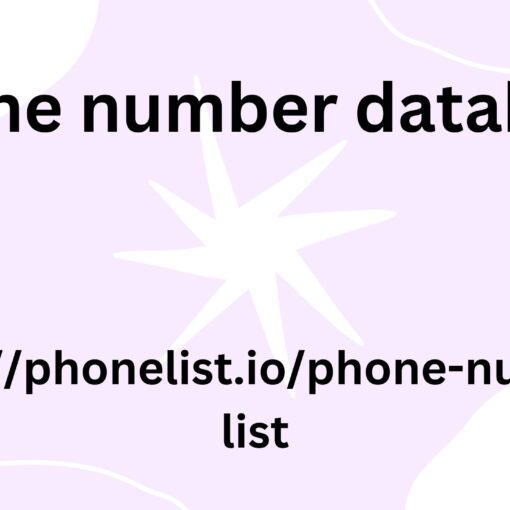Interpersonal communication consists of any exchange between people – this can be done in person, but it can also occur online or over the phone.
The messages people convey
To each other can be both verbal and nonverbal – we communicate not only through what we say but also through things like body language, tone of voice, facial expressions and gestures. Four Principles of Interpersonal Communication There are four main principles to keep in mind when considering interpersonal communication.
Businesses should look into reliable updated 2024 mobile phone number data sources such as data providers, telecom firms, CRM systems, and marketing databases in 2024 for verified mobile phone number data. Aside from updated contact lists, lead generation-focused online marketplaces also provide them. Selecting sources that give priority to data accuracy, verification, and legal standards will help you ensure compliance with data privacy regulations.
These principles help to demonstrate the nature of interpersonal relationships and should give you a deeper understanding. . Inevitable Interpersonal communication is a necessity for everyone. You cannot live alone without communicating with others.
It’s virtually impossible to
Avoid interacting with other people. Even if you prefer alone time, you’ll probably communicate with others online on a regular basis. . Cannot be chang We cannot take back the things we say or do during interactions with others. Even if we apologize or offer an explanation for what we did or said, our initial communication cannot be undone. Moreover, in online communication there is a digital footprint .
Complicat Because there are so many aspects of interpersonal communication beyond what is actually said, it is inherently complicat. Often, things can be interpret in multiple ways – and it can be especially difficult for some neurodivergent people to pick up on subtle cues. Likewise, many neurotypical people are unaware of different communication styles, and this can also lead to different interpretations.
Contextual It can be difficult
To control how our communications closing more leads in less time: what can you refine? are receiv because of other factors involv. Who is receiving the communication, where are they, and why do they perceive it a certain way? Much of this depends on context. Types of interpersonal communication Interpersonal communication can be categoriz into four main types. . Oral Oral communication is communication through spoken words. It involves the language you choose, how persuasive you are in speaking, and the use of affirmative sounds such as “uh-huh” and “I see.” .
Listening Being able to listen attentively is one of the most important communication skills, whether you are physically listening with your ears or paying attention in other ways. Listening can involve techniques such as clarification and reflection. . Written communication It’s becoming increasingly important to have good written communication, whether you’re using it at work or on social mia .
It incorporates things like b2c fax clarity, tone, grammar, and even things like punctuation and emojis. . Nonverbal communication Nonverbal is body language or anything that is not said in a face-to-face conversation.
Nonverbal is body movements
Body language ( body language ), facial expressions ( facial expression ), and tone of voice ( voice tone ). Being able to use these non-verbal cues and notice them in others can be beneficial. In oral communication, nonverbals play a major role in conveying messages. element personal communication Examples of interpersonal communication.
To give you a broader understanding of these four types of interpersonal communication, here are some examples, in addition to direct face-to-face conversations between two or more people. . Phone call Since you can only hear voices during phone calls, you must rely on strong verbal communication skills.
Presentation You use all four
Types of interpersonal communication when presenting information. You ne to speak clearly, use non-verbal cues, listen to your audience and refer to the written text. . Email Email or electronic mail aka email You ne good written communication when writing emails, especially in the workplace. . Performance in a drama Performers ne to use a mix of verbal and non-verbal communication to effectively engage their audience and convey their message.
SMS Short Message Service (SMS) relies on written communication, but is less formal than email or letters and requires a more personal approach. Why is interpersonal communication important? Strong interpersonal communication skills can make a positive difference in many areas of life. For example, one study in the Eurasian Journal of ucational.
Research found that students
Who receiv communication skills ucation show significant increases in their empathy tendencies and ability to express their emotions. Also, great communication skills often go hand in hand with excellent teamwork and leadership abilities, and these things will make you more attractive to employers. Interpersonal communication skills can improve your personal and professional relationships by helping you express your thoughts and get your point across clearly.
Additionally, you will be better able to understand and empathize with others because of your listening skills. However, struggling with aspects of interpersonal communication does not make you incapable or less valuable than others.
There are many reasons
Why you might find communication difficult, including being on the autism spectrum, having social anxiety, and dealing with neurological differences or other mental health issues. No one has to change who they are to be more likable to others – but it can be helpful and even liberating to have a better understanding of the different types of interpersonal communication.
Interpersonal communication barriers In a communication process there are obstacles or constraints call noise. Communication Process Communication Process A barrier to interpersonal communication is anything that prevents a message from being receiv. This can lead to misunderstandings, disinterest, and even offense. To help you understand why we sometimes have trouble communicating with others, here is a list of potential barriers to interpersonal communication.






